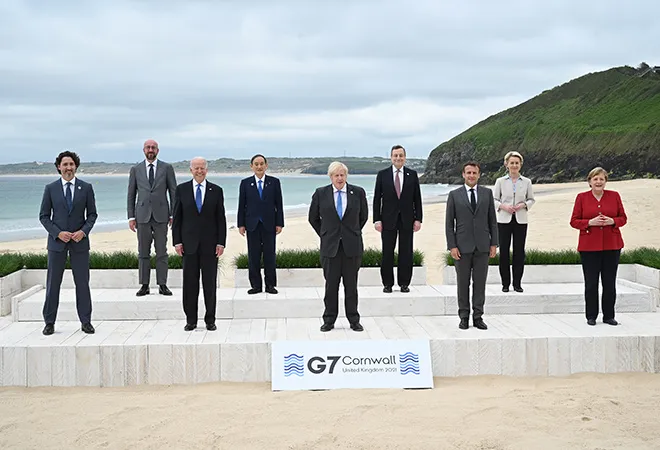
The leaders of industrialised nations produced many photo-ops against the English coastline, complete with strolls and barbecues but did not generate any kind of determined response expected to meet today’s multiple global challenges.
If there was a time when ambition should have defined international action and coordination, it was last week, but leaders of the richest nations seemed driven by their narrow national agendas. It was the first in-person summit of the G-7 since the coronavirus spread around the world had shut down economies.
Much was expected—a plan of action to end the pandemic, injecting life into the global economy, providing new resources to fight climate change, and painting a vision for how they see the new order evolving. On some issues, it was a complete failure; on others, a partial success.
A whole lot of energy was spent establishing that “America is back”, and expressions of relief at the absence of Donald Trump and the presence of Joe Biden. The feud between Prime Minister Boris Johnson and President Emmanuel Macron over post-Brexit trading rules for Northern Ireland dominated at least one news cycle.
Apart from welcoming Biden, the Europeans weren’t ready to adopt his agenda on China besides condemning Beijing for human rights abuses—the easiest box to check on the Asian giant. Even that was vague and ended up kicking the ball down the road to a task force to find ways to ban products made by forced labour.
Apart from welcoming Biden, the Europeans weren’t ready to adopt his agenda on China besides condemning Beijing for human rights abuses—the easiest box to check on the Asian giant. Even that was vague and ended up kicking the ball down the road to a task force to find ways to ban products made by forced labour.
The
25-page communiqué was verbose, declaring the G-7 partnership “revitalised” and ready to “build back better” with “freer, fairer trade” within a reformed trading system. It promised the well-being of “all people” in one of the more grandiloquent statements.
In terms of concrete announcements, the G-7 promised one billion vaccine doses to the world’s poorest countries over the next year. It’s literally a drop in the bucket, if the aim is to vaccinate at least 40 percent of the population in all countries by the end of 2021, as the International Monetary Fund (IMF) recommended in a paper last month.
The WHO has said 11 billion doses are needed to vaccinate 70 percent.
The IMF paper, written by Ruchir Agarwal and Gita Gopinath, puts it simply: “Pandemic policy is also economic policy”, because without containing the pandemic, economies can’t recover. The cost of vaccinating 40 percent of the world is estimated around US $50 billion but there is funding gap of around US $22 billion. The G-7 commitment to the “WHO COVID-19 effort under the Act-Accelerator” partnership is US $10 billion. This leaves a big hole, which the G-7 didn’t try filling in between their beach runs and dunks in the ocean.
On climate change, the G-7 reaffirmed their goal to keep the global warming threshold at 1.5 Celsius and cut their emissions by half by 2030 but failed to commit on resources for developing countries. This doesn’t set a strong stage for COP26, the UN climate talks to be held in Glasgow in November. The climate financing goal of US $100 billion a year by 2020 is far from being met while mistrust is growing between those who create the climate crisis and those who must undertake the clean-up.
On climate change, the G-7 reaffirmed their goal to keep the global warming threshold at 1.5 Celsius and cut their emissions by half by 2030 but failed to commit on resources for developing countries. This doesn’t set a strong stage for COP26, the UN climate talks to be held in Glasgow in November
So some leaders announced funds they had previously made public as Johnson did while others were happy simply to sign the communiqué and “welcome the commitments already made by some of the G-7 to increase climate finance.” Poor countries buried under rising debt burdens from coping with the pandemic are expected to find their own resources for clean technology.
The one important achievement, which should have got more applause than it did, was the agreement on a 15 percent global minimum tax on multinational corporations that have managed to game the system for years by hiding their profits in offshore havens. The new tax could be the beginning of the end of at least the most brazen abuses, especially by big tech companies. But a lot of rules have to be made and loopholes closed before Amazon and Google will pay a fair share of taxes.
This seismic shift in perspective in the Western mind is partly due to the ferment in Democratic Party politics in the United States (US) and the rise of the progressives. As the ultimate pragmatist, Biden recognised the moment and initially put a proposal to tax the corporations at 21 percent.
But on China, the Europeans shied away from Biden’s hardline, choosing to debate “the depth of the challenge” instead of formulating a joint approach. German Chancellor, Angela Merkel, was all about cooperation, recognising that China and G-7 have different “social systems”.
In the end, the only thing they agreed on was to mention human rights abuses in Xinjiang, something Beijing can easily ignore because there is no price to pay. China is betting on a US-Europe divide and, thus far, that’s proving to be the case. Those looking for a united front, a clear direction and definitive policies will have to wait longer.
The views expressed above belong to the author(s). ORF research and analyses now available on Telegram! Click here to access our curated content — blogs, longforms and interviews.



 The leaders of industrialised nations produced many photo-ops against the English coastline, complete with strolls and barbecues but did not generate any kind of determined response expected to meet today’s multiple global challenges.
If there was a time when ambition should have defined international action and coordination, it was last week, but leaders of the richest nations seemed driven by their narrow national agendas. It was the first in-person summit of the G-7 since the coronavirus spread around the world had shut down economies.
Much was expected—a plan of action to end the pandemic, injecting life into the global economy, providing new resources to fight climate change, and painting a vision for how they see the new order evolving. On some issues, it was a complete failure; on others, a partial success.
A whole lot of energy was spent establishing that “America is back”, and expressions of relief at the absence of Donald Trump and the presence of Joe Biden. The feud between Prime Minister Boris Johnson and President Emmanuel Macron over post-Brexit trading rules for Northern Ireland dominated at least one news cycle.
Apart from welcoming Biden, the Europeans weren’t ready to adopt his agenda on China besides condemning Beijing for human rights abuses—the easiest box to check on the Asian giant. Even that was vague and ended up kicking the ball down the road to a task force to find ways to ban products made by forced labour.
The leaders of industrialised nations produced many photo-ops against the English coastline, complete with strolls and barbecues but did not generate any kind of determined response expected to meet today’s multiple global challenges.
If there was a time when ambition should have defined international action and coordination, it was last week, but leaders of the richest nations seemed driven by their narrow national agendas. It was the first in-person summit of the G-7 since the coronavirus spread around the world had shut down economies.
Much was expected—a plan of action to end the pandemic, injecting life into the global economy, providing new resources to fight climate change, and painting a vision for how they see the new order evolving. On some issues, it was a complete failure; on others, a partial success.
A whole lot of energy was spent establishing that “America is back”, and expressions of relief at the absence of Donald Trump and the presence of Joe Biden. The feud between Prime Minister Boris Johnson and President Emmanuel Macron over post-Brexit trading rules for Northern Ireland dominated at least one news cycle.
Apart from welcoming Biden, the Europeans weren’t ready to adopt his agenda on China besides condemning Beijing for human rights abuses—the easiest box to check on the Asian giant. Even that was vague and ended up kicking the ball down the road to a task force to find ways to ban products made by forced labour.
 PREV
PREV


